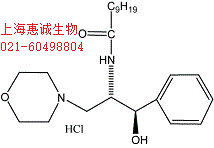      |

 通过认证 [诚信档案]
通过认证 [诚信档案]

| Cat. Number |
H1749
|
| Chemical Name |
L-threo-PDMP
|
| CAS Number |
109836-81-9
|
| Category |
synthetic
|
| Mol. Formula |
C23H38N2O3•HCl
|
| Mol. Weight |
427
|
| Qty 1 |
10mg
|
| Appearance |
solid
|
| Application Notes |
98+% TLC
|
| Synonym |
L-threo-1-Phenyl-2-decanoylamino-3-morpholino-1-propanol•HCl
|
| Solubility |
ethanol, methanol
|
| Storage condition |
-20°C
|
| References |
L-threo-PDMP is a glucosylceramide synthase inhibitor, an enzyme that is essential for the synthesis of a very large number of different glycolipids that are found in many organisms.1 PDMP has four possible isomers due to its two chiral centers (Dthreo, L-threo, D-erythro, and L-erythro). This product is the L-threo (1S,2S) isomer. The D-threo isomer has been shown to be the active glucosyl ceramide synthetase inhibitor.2 However, treatment with the L-threo isomer has been shown to contribute to an increase in the amount of lactosyl ceramide and may have other effects as well.3 Due to PDMP’s ability to inhibit the joining of ceramides with carbohydrates there can be an accumulation of ceramide in the cells and this can lead to apoptosis. This process has been suggested as a treatment for cancer.4 In addition to its stereochemistry, the acyl chain of PDMP has a very marked effect on the intensity of the inhibitory action of the molecule. Conduritol B epoxide (CBE), an inhibitor of beta-glucosidase, and l-phenyl-2-decanoylamino-3-morpholino-l-propanol (PDMP), an inhibitor of glucosylceramide synthase, can be used to create a model of Gaucher disease and consequently an accumulation of glucopsychosine.5 |